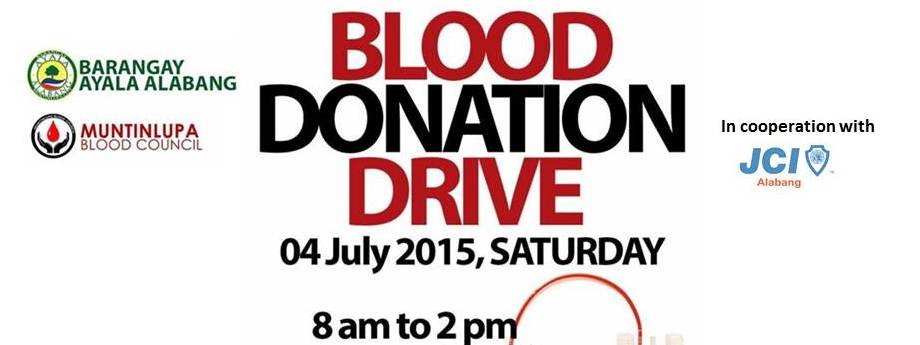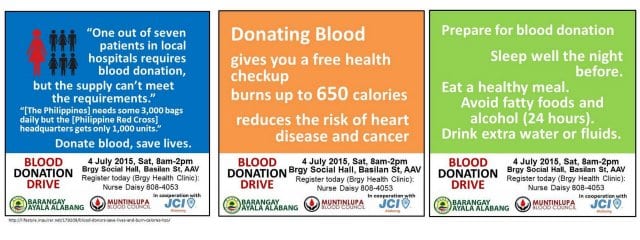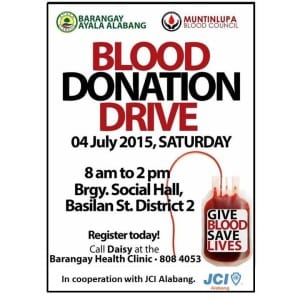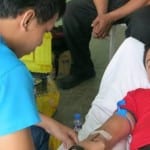Donate Blood, Save Lives – Blood Donation Drive – July 4
Did you know that when you donate blood, you are saving lives? The demand for blood outstrips the supply of the Philippine Red Cross.
Did you know that donating blood has many benefits? Donating blood gives you a free health checkup, burns up to 650 calories, and reduced the risk of heart disease and cancer.
Join us in saving lives. Barangay Ayala Alabang and Muntinlupa Blood Council, in cooperation with JCI Alabang, will hold a blood donation drive on July 4, 2015 in the Barangay Social Hall.
Tips for prepare for blood donation: Sleep well, eat a healthy meal, avoid fatty foods and alcohol 24 hours prior to blood donation, and drink extra water.
Donate Blood, Save Lives.
Blood Donation Drive, Jul 4, 2015 (Sat), 8am-2pm, Barangay Social Hall, Basilan St, Ayala Alabang Village.
Register today with Nurse Daisy 808-4053.
Organized by Barangay Ayala Alabang and Muntinlupa Blood Council
In coordination with JCI Alabang
From the Philippine Red Cross site
Preparation before donating blood
1. Have enough rest and sleep.
2. No alcohol intake 24 hours prior to blood donation.
3. No medications for at least 24 hours prior to blood donation.
4. Have something to eat prior to blood donation, avoid fatty food.
5. Drink plenty of fluid, like water or juice.
Steps in donating blood
1. Have your weight taken.
2. Register and honestly and complete the donor registration form.
3. Have your blood type and hemoglobin checked.
4. A physician will conduct a blood donor examination.
5. Actual donation–the amount of blood to be donated (either 350cc or 450cc) will depend on the donor’s weight and blood pressure. It usually takes 10 minutes or less.
6. A 5 to 10 minute rest and plenty of fluid-intake are necessary after donation.
What to do after blood donation?
1. Drink plenty of fluid, like water or juice.
2. Refrain from stooping down after blood donation.
3. Refrain from strenuous activities like:
a. Lifting heavy objects;
b. Driving big vehicles such as bus, trucks, etc.; or
c. Operating big machines.
4. Avoid using the punctured arm in lifting heavy objects.
5. Apply pressure on the punctured site and lift the arm in case the site is still bleeding.
6. If there is discoloration and swelling on the punctured site, you may apply cold compress for 24 hours.
7. If there is dizziness, just lie down with your feet elevated. Drink plenty of juice; and in just a few minutes or so, it will pass.
Blood Donation: Basic Requirements
Blood donation helps save lives. Find out if you’re eligible to donate blood and what to expect if you decide to donate.
The need for blood is great. On any given day, more than two thousand of blood units are transfused to patients in our country. Some may need blood during surgery; while others depend on it after an accident or because they have a disease that requires blood components. The Philippine Red Cross approximately supplies one-fourth of the country’s national blood requirements.If you’re in good health, you can probably donate. Find out about blood donation and what to expect if you decide to give.
Who can donate blood?
You can donate blood if you…
– Are in good health
– Are between 16 to 65 years old (16 and 17 years old need parents consent);
– Weigh at least 110 pounds;
– Have a blood pressure between: Systolic: 90-160 mmHg, Diastolic: 60-100 mmHg; and
– Pass the physical and health history assessments.
PRC Blood Services Facilities carefully screen potential donors. The screening guidelines are necessary to ensure that blood donation is safe for you and that it is safe for the person who will be receiving your blood.
In the screening process, you have to fill out a blood donation questionnaire form that includes direct questions about behaviors known to carry a higher risk of blood-borne infections—infections that are transmitted through the blood. These behaviors include prostitution, intravenous drug use and others. A trained physician will be asking you about your medical/ health history, and a physical examination will be conducted—which includes checking your blood pressure, pulse and temperature. All of the information from this evaluation is kept strictly confidential.
During your blood donation screening procedure, a small sample of blood taken from a finger prick is used to check your hemoglobin level, the oxygen-carrying component of your blood. If your hemoglobin concentration is normal, and you’ve met all the other screening requirements, you can donate blood.
Where can I donate blood?
Use the PRC Blood Services Facility Directory to find the blood donation center nearest you, and then contact the blood center to find out more about the requirements.










